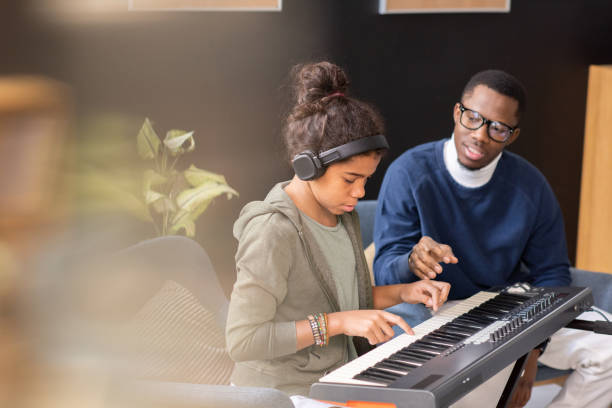
The Transformative Impact of Learning a Musical Instrument on Young People
Today we look at The Transformative Impact of Learning a Musical Instrument on Young People. Music is a universal language that has the power to inspire, heal, and transform lives. For young people, learning a musical instrument offers a multitude of benefits that extend far beyond the joy of creating melodies. It can serve as a powerful tool to engage their minds, steer them away from social vices, and lay the foundation for a successful and fulfilling life. In this blog, we’ll explore how playing an instrument impacts the mental, emotional, and social development of young people and how it can become a meaningful pathway for positive change.
1. A Creative Outlet for Emotional Expression
Music provides a safe and constructive outlet for young people to express their emotions. Playing an instrument allows them to channel their feelings, whether it’s joy, frustration, or sadness, into something creative and beautiful. This emotional expression helps young individuals develop greater emotional intelligence, enabling them to better understand and manage their feelings.
A study published in the Journal of Youth Development highlights that young musicians often report a higher sense of emotional well-being compared to their peers. By learning to articulate emotions through music, they build resilience and develop healthier coping mechanisms for dealing with life’s challenges.
2. Building Discipline and Responsibility
Mastering a musical instrument requires commitment, practice, and perseverance. These habits foster discipline and a strong sense of responsibility, traits that are crucial for personal and academic success. Regular practice teaches young people the importance of setting goals, managing their time effectively, and working consistently to achieve their aspirations.
3. Keeping Minds Engaged and Away from Social Vices
Idle time can often lead young people to engage in unproductive or harmful activities. Learning a musical instrument provides a structured and engaging activity that keeps their minds occupied and focused on a positive pursuit. It offers a sense of purpose and achievement, which can act as a powerful deterrent against the allure of social vices like substance abuse or delinquent behavior.
Research conducted by the National Endowment for the Arts reveals that participation in music programs reduces the likelihood of risky behaviors in adolescents. The study emphasized that young people involved in music are more likely to excel academically and maintain a strong sense of community involvement.
4. Enhancing Cognitive Skills
Learning to play an instrument is like a workout for the brain. It improves memory, attention, and problem-solving skills by engaging multiple areas of the brain simultaneously. Studies from Neuroscience Letters have shown that young musicians exhibit enhanced neural connectivity, which translates to better academic performance, particularly in math and reading.
The ability to read music, coordinate movements, and interpret sounds sharpens both cognitive and motor skills. These benefits extend beyond the music room, helping young people excel in other aspects of their lives.
5. Fostering Teamwork and Social Connection
Music is often a collaborative effort, whether through school bands, orchestras, or informal jam sessions with friends. Playing in a group teaches young people how to work as a team, listen to others, and value everyone’s contribution. These social experiences help them build confidence, improve communication skills, and foster lasting friendships.
6. Developing Leadership Skills
For those who advance in their musical journey, opportunities to mentor others or take leading roles in performances arise. These experiences nurture leadership qualities and instill a sense of responsibility. Young musicians learn how to guide their peers, make decisions, and inspire others—skills that are invaluable in any career path.
7. Therapeutic Benefits for Mental Health
Playing an instrument has been shown to reduce stress and anxiety levels in young people. The focused attention required during practice acts as a form of mindfulness, helping them stay present and alleviate worries. Furthermore, music’s calming effect on the mind has been widely recognized in studies published in the Journal of Adolescence, which found that music engagement significantly reduces symptoms of depression and anxiety in teenagers.
8. A Pathway for Youth with Special Needs
For young people with autism or learning disabilities, learning an instrument can be particularly transformative. Music therapy has been proven to improve focus, communication, and social interaction for children on the autism spectrum. Instruments like the drum can help regulate sensory input, while the piano enhances hand-eye coordination and cognitive flexibility.
Research from the Journal of Music Therapy indicates that structured musical activities improve the emotional and social well-being of individuals with special needs, giving them a sense of achievement and confidence.
9. Encouraging Creativity and Innovation
Learning to play an instrument nurtures creativity by allowing young people to experiment with different sounds, styles, and rhythms. This creative process encourages them to think outside the box and approach challenges with an innovative mindset. Over time, these skills can translate into enhanced problem-solving abilities and a greater capacity for critical thinking.
How to Encourage Young People to Learn an Instrument
- Start Early: Encourage children to explore different instruments and choose one that resonates with their interests.
- Create a Supportive Environment: Provide the tools and encouragement they need, such as access to lessons, practice time, and positive reinforcement.
- Promote Group Activities: Enroll them in music groups or community bands to foster social connections and teamwork.
- Celebrate Progress: Acknowledge their achievements, no matter how small, to keep them motivated.
Conclusion
Learning a musical instrument is more than just a hobby; it’s a life-changing journey that equips young people with essential skills and values. From emotional expression to cognitive development, from steering clear of social vices to fostering creativity, the benefits are profound and far-reaching.
In a world filled with distractions and challenges, music offers young people a safe and constructive path to self-discovery, growth, and success. Encourage the young individuals in your life to pick up an instrument—the impact will resonate far beyond the notes they play.

